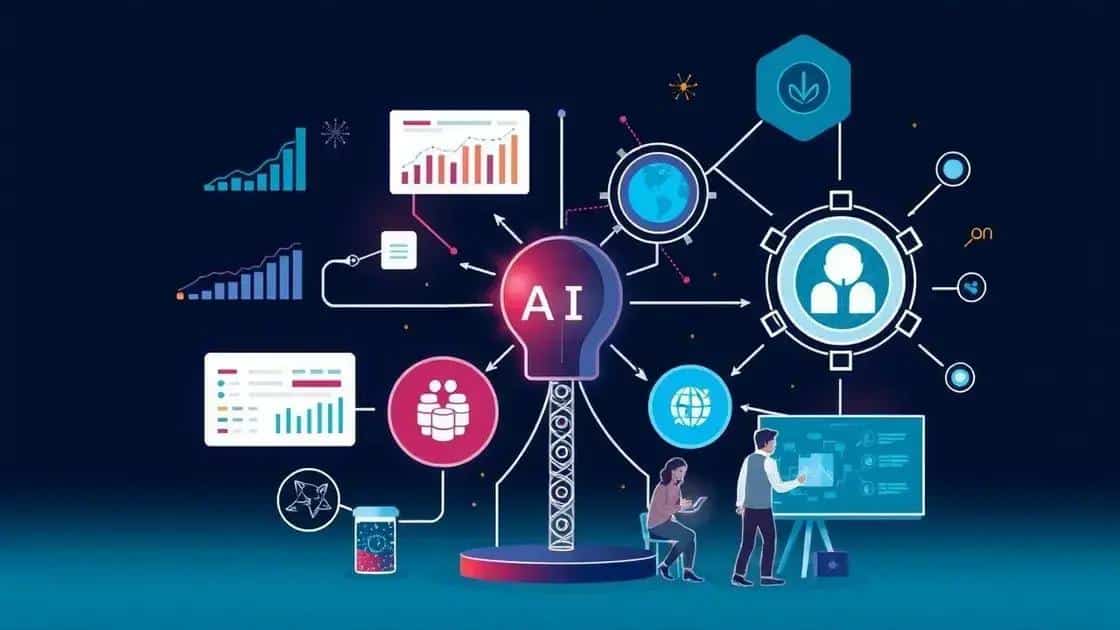What will happen to marketing in the age of AI?

Measuring success in AI-driven marketing involves utilizing key performance indicators (KPIs), leveraging AI for rapid data analysis, and incorporating customer feedback to optimize strategies effectively.
What will happen to marketing in the age of AI? This question looms large for brands seeking to navigate a rapidly evolving landscape. As we dive deeper into AI’s influence, it becomes clear that adaptation is not just necessary; it’s vital for survival. You may wonder, how can businesses harness AI to connect with their audience?
Understanding the impact of AI on marketing strategies
Understanding the impact of AI on marketing strategies is essential for businesses looking to thrive in today’s digital landscape. As technology evolves, marketers must adapt to leverage the advantages that AI offers. This adaptation can redefine how brands connect with their customers.
How AI Transforms Consumer Interactions
Artificial Intelligence transforms how businesses interact with consumers by personalizing experiences at scale. By analyzing data from various sources, AI can understand consumer behavior and preferences, enhancing engagement.
Key Benefits of AI in Marketing
- Increased Efficiency: AI automates routine tasks, freeing up time for creative strategy development.
- Enhanced Targeting: Brands can reach more relevant audiences with improved targeting techniques.
- Better Insights: AI analyzes vast amounts of data to provide insights that drive informed decision-making.
Moreover, AI not only optimizes advertising campaigns but also aids in crafting personalized content. By utilizing algorithms, businesses can tailor messages that resonate with individual consumers instead of generic approaches. Incorporating AI-driven insights helps brands to create content that captivates their audience.
As we move forward, the reliance on AI will only grow. Therefore, marketers need to embrace these technologies and integrate them into their strategies. By doing so, they can remain competitive and foster meaningful connections with their customers.
Personalization through AI technologies

Personalization through AI technologies is revolutionizing how brands interact with their customers. By using data and algorithms, businesses can tailor experiences to fit individual needs, making consumers feel valued.
Understanding Personalization in Marketing
Personalization in marketing means creating targeted experiences for each customer. This can range from personalized emails to customized website content. By analyzing user data, businesses can understand preferences and behaviors, leading to more effective marketing campaigns.
Key AI Technologies for Personalization
- Machine Learning: Helps in analyzing user data to predict future behaviors.
- Natural Language Processing: Enables understanding customer queries and responding in personalized ways.
- Predictive Analytics: Forecasts what consumers may want based on past interactions.
Implementing AI technologies for personalization not only improves user experience but also boosts customer loyalty. When customers feel understood and valued, they are more likely to engage with a brand repeatedly. This is key to staying competitive in a fast-paced market.
While leveraging AI for personalization, it’s important to maintain a balance. Brands need to ensure they respect user privacy while collecting data. Clear communication about data usage can enhance trust.
Challenges faced by marketers in the AI era
Challenges faced by marketers in the AI era are numerous and complex. As companies increasingly rely on artificial intelligence, it’s crucial to understand the potential obstacles that can hinder effective implementation and strategy.
Understanding Data Privacy Issues
One of the primary challenges is navigating data privacy regulations. With rising concerns about how data is collected and used, marketers must ensure compliance with laws like GDPR and CCPA. Failure to adhere to these regulations can lead to significant penalties.
The Skills Gap in the Workforce
Another major challenge is the skills gap among marketing professionals. Not all marketers are well-versed in AI technologies, which can prevent companies from maximizing the potential of these tools. Continuous education and training are essential for bridging this gap.
- Limited understanding of AI: Many marketers may not grasp how AI can enhance their strategies.
- Resistance to change: Some may be hesitant to adopt new technologies.
- Budget constraints: Implementing AI solutions can be expensive, and smaller businesses may struggle with funding.
Moreover, as AI generates large amounts of data, marketers face the challenge of sifting through this information to derive actionable insights. Sorting through noise to find relevant data requires skilled analysis and the right AI tools.
Additionally, maintaining a personal touch in marketing becomes difficult as automation increases. Businesses must find a balance between using AI for efficiency while still nurturing authentic relationships with customers.
Measuring success in AI-driven marketing

Measuring success in AI-driven marketing is crucial for understanding how well strategies are performing. With the integration of AI, businesses can leverage advanced analytics to gauge the effectiveness of their campaigns.
Key Performance Indicators (KPIs)
Identifying the right KPIs is essential in evaluating marketing success. Common KPIs include conversion rates, customer acquisition costs, and engagement metrics. These indicators help marketers determine which strategies are effective and where adjustments are needed.
Utilizing AI for Data Analysis
AI technologies can process vast amounts of data quickly, offering valuable insights that help optimize marketing efforts. With machine learning algorithms, brands can predict trends and consumer behavior, leading to more informed decision-making.
- Attribution Models: AI helps in understanding which channels contribute most to conversions.
- Real-Time Analytics: Marketers can monitor campaigns continuously and make swift changes.
- Customer Insights: AI provides deeper understanding of customer preferences and behaviors.
Moreover, visualizing this data through dashboards can enhance understanding. Dashboards offer a clear representation of how marketing initiatives are performing over time. Regularly reviewing these metrics allows businesses to remain agile while refining their tactics.
While it’s important to focus on quantitative data, incorporating qualitative feedback from customers also matters. Engaging with customers to gain insights can provide context that numbers alone might not reveal. This combination ultimately leads to stronger AI-driven marketing strategies.
FAQ – Frequently Asked Questions about Measuring Success in AI-Driven Marketing
What are key performance indicators (KPIs) in AI-driven marketing?
KPIs are measurable metrics that help marketers assess the effectiveness of their strategies, including conversion rates and customer acquisition costs.
How can AI improve data analysis for marketing?
AI can quickly analyze large data sets, providing valuable insights and predictions that support informed decision-making.
Why is customer feedback important in measuring success?
Customer feedback provides qualitative insights that help marketers understand experiences and preferences, enriching quantitative data.
What role do dashboards play in monitoring marketing success?
Dashboards visually summarize key metrics, enabling marketers to track real-time performance and make quick adjustments to their strategies.





